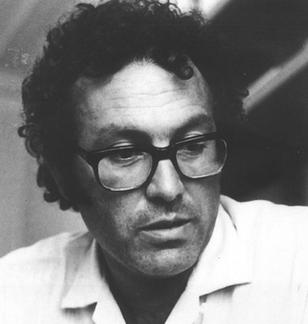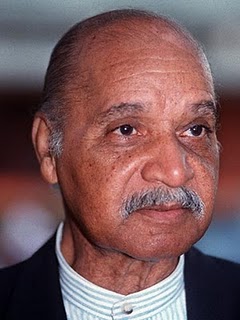Early life, career and death
Nguenha started to sing in the church 'Assembleia de Deus' and by that time he pretended to be a pastor.
He started to sing in order to spread the message of social injustice and educative messages to the people. In 1994/1995 his songs appear like magic from scratch in the radios, being the most famous 'Vadhla Vôche'. In his words he pretended to: 'denounce the selfishness, hypocrisy and corruption that tainted the society'. His style also used to shock the Mozambican public that got connected with his message quickly. He used to present himself with military clothes and a military type haircut, carrying the bible many times with him on stage. He soon released one of his biggest hits La Famba bicha ("The line goes on").
Ngenha gets the opportunity to make some international digressions to South Africa, where he performs to the Mozambican community. And in 2002 he is invited to Brazil, where he performs in the most famous celebration Rio Carnival. Due to financial constrains he goes alone, leaving his band in Mozambique.
In 2001, he was awarded with the Mozambican National prize - Ngoma Mozambique - for the most famous song. In the same year, the current president of that time - Joaquim Chissano - invites him to the official residence - Palácio da Ponta Vermelha. According to the press the only thing he asks to the president is for the bible.
Even though he succeeded as a singer, he was also a football player, he played in Swaziland and South Africa. However a knee injury dictated the end of his career. Artistically he also performed as an actor.
On May 3, 2007, at the age of 35, the notice of his death due to illness shocked the entire Mozambique and the music association. The music association soon demands that Mozambican artists should have better conditions to the artists since many of them died of illness, not having financial conditions to afford better health treatments for their condition. In the previous years, the music association was dealing with consecutive losses of the artists due to illness.

Samora Moisés Machel was a Mozambican military commander and political leader. A socialist in the tradition of Marxism–Leninism, he served as the first President of Mozambique from the country's independence in 1975.

Marisa dos Reis NunesComIH, known professionally as Mariza, is a Portuguese fado singer.

José Manuel Cerqueira Afonso dos Santos, known professionally as José Afonso and also popularly known as Zeca Afonso, was a Portuguese singer-songwriter. He is widely regarded as one of the most influential figures in the history of Portugal's folk and protest music scene. His music played a significant role in the resistance against the dictatorial Estado Novo regime, making him an icon in Portugal.

José Craveirinha was a Mozambican journalist, story writer and poet, who is today considered the greatest poet of Mozambique. His poems, written in Portuguese, address such issues as racism and the Portuguese colonial domination of Mozambique. A supporter of the anti-Portuguese group FRELIMO during the colonial wars, he was imprisoned in the 1960s. He was one of the African pioneers of the Négritude movement, and published six books of poetry between 1964 and 1997. Craveirinha also wrote under the pseudonyms Mário Vieira, José Cravo, Jesuíno Cravo, J. Cravo, J.C., Abílio Cossa, and José G. Vetrinha.
Luís Bernardo Honwana is a Mozambican author and statesman.

Blind Zero are a Portuguese rock band from the city of Porto. They won the 2003 MTV Europe Music Award for the Best Portuguese Act.
Francisco Queriol Conde Júnior, known as Chiquinho Conde, is a Mozambican former footballer who played as a striker, currently manager of Mozambique.
The culture of Mozambique is in large part derived from its history of Bantu, Swahili, and Portuguese rule, and has expanded since independence in 1975. The majority of its inhabitants are black Africans. Its main language is Portuguese. Its median religion is Roman Catholicism, but only about 40% of the inhabitants are Christian. It has a rich history in the areas of arts, cuisine, and entertainment.
Júlio Eduardo Zamith Carrilho was a Mozambican politician, long-time member of FRELIMO, as well as a university professor and author. Carrilho started his professional career as an architectural draftsman in a private architecture office in his hometown of Pemba. He moved to Lisbon in 1971 to study for his undergraduate degree (Licenciatura) in Architecture at the University of Lisbon, which he completed in 1973. He held a PhD in Architecture and Environment from the Sapienza University of Rome (2006). He lived briefly in Sweden, where he fled to escape the Portuguese secret police PIDE, then returning to Maputo in September 1974, at the age of 28. Already a member of FRELIMO then, he was appointed to the Transition Government as the Secretary of State for Public Works and Housing, transitioning to the office of Minister for Public Works and Housing in the first government of independent Mozambique. He held this post between 1975–1978, 1980–1983 and 1983–1987, the latter as the Minister of Construction and Water. He also served as Minister of Industry and Energy between 1978 and 1980.
Ethnic Chinese in Mozambique once numbered around five thousand individuals, but their population fell significantly during the Mozambican Civil War. After the return of peace and the expansion of Sino-Mozambican economic cooperation, their numbers have been bolstered by new expatriates from the People's Republic of China.
Ricardo Achiles Rangel was a Mozambican photojournalist and photographer.
João Theodoro Meirelles, better known as J. T. Meirelles, is a Brazilian saxophonist and flautist. He was born in Rio de Janeiro, Brazil and died at 67 years old in that same city. Meirelles is considered one of the creators of the samba-jazz rhythm, along with Manfredo Fest.
Zainadine Abdula Chavango Júnior is a Mozambican professional footballer who plays as a centre back for Portuguese club Marítimo.
The sport of football in the country of Mozambique is run by the Mozambican Football Federation. The association administers the national football team, as well as the national league. Football is the most popular sport in the country.
Humberto Carlos Benfica, known as Wazimbo, is a Mozambican vocalist considered one of the greatest voices of Mozambique and one of the most famous marrabenta singers. Born in Chibuto, in Gaza Province, Mozambique he moved to the capital — Lourenço Marques — where he grew up in the popular neighborhood Mafalala. There he started as a vocal member for the local group "Silverstars" and then "Geiziers". Later, he joined Orchestra Marrabenta Star de Moçambique.
Stewart Sukuma, born Luis Pereira in 1963, is a Mozambican singer. Sukuma's stage name means "rise up" in Xitsonga and "push" in Swahili. He was born in Cuamba, Niassa Province. Coming from a modest family, Sukuma loved music; he moved to the Mozambican capital of Maputo in 1977, learning to play percussion instruments, guitar and piano. Five years later, Sukuma joined a musical group as a vocalist. He received a Ngoma Mozambique award in 1983, and has been described as "Mozambique's most popular male vocalist". Sukuma's songs include "Felizminha", "Xitchuketa Marrabenta", "Sumanga", "Male" and "Why". He sings in Portuguese, English, Swahili, Echwabo and Xitsonga.
Elisa Domingas Jamisse, better known by her stage name Mingas, is a Mozambican singer. Born in the capital city, Maputo in Mozambique Mingas started to sing at a very early age. Her music is a mixture of Afro sounds that gives prominence to the rhythms of the Chope people of southern Mozambique, and she is one of the most famous singers of Marrabenta. Her career is marked with big hits and collaborations with major African singers like Miriam Makeba, Hugh Masekela, Angélique Kidjo, Baba Maal, Yvonne Chaka Chaka, Jimmy Dludlu, Gilberto Gil, among others.
Edson Abel Jeremias Tchamo, known by his stage name Laylizzy, is a Mozambican, hip-hop recording artist, songwriter and performer who raps in Portuguese and English.

Fundação Fernando Leite Couto, Portuguese for "Foundation Fernando Leite Couto", is a foundation and cultural centre in Mozambique's capital Maputo. It was founded in 2015 and is named after the Portuguese-Mozambican writer Fernando Leite Counto. The foundation has its seat in a building developed by Pancho Guedes at Avenida Kim Il Sung 961 in the Sommerschield neighbourhood.
Daniel David was born in Maputo, Mozambique. He is a CEO & Chairman of DHD Holding and SOICO Group. And he is one of the main voices of the region advocating for sustainable development, economic growth, innovation and the use of technology for the digital transformation of Africa.





